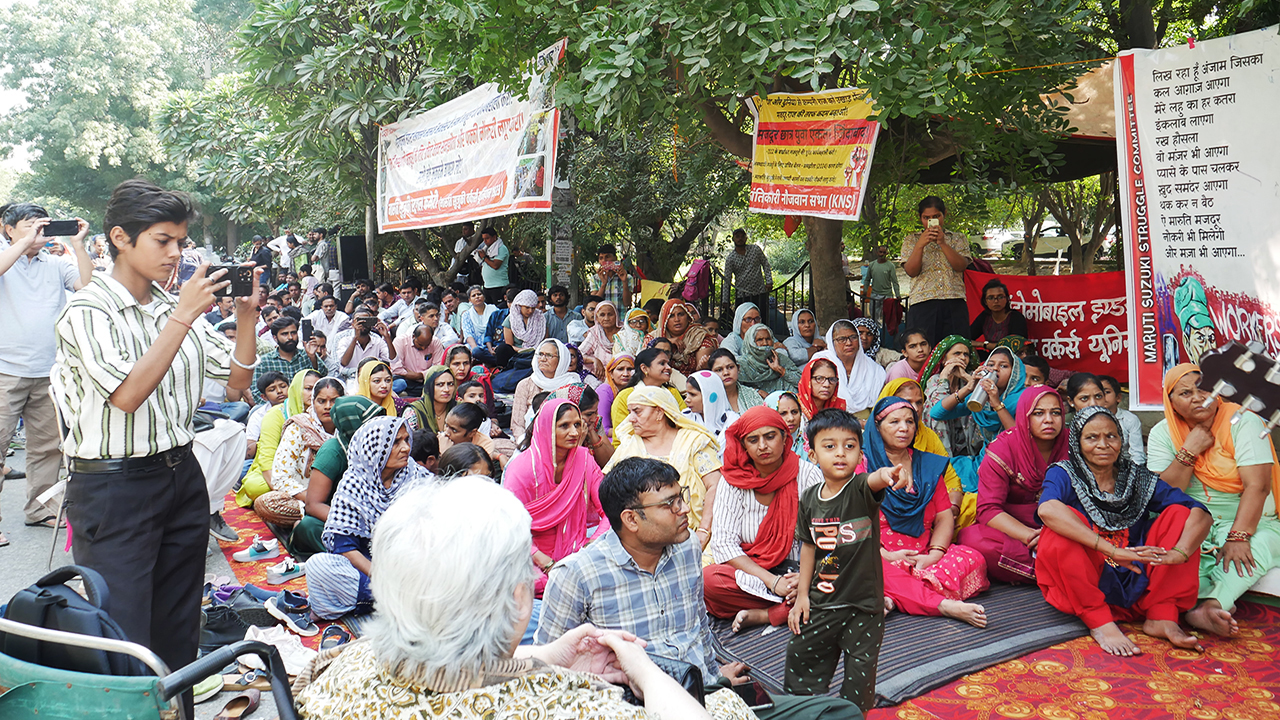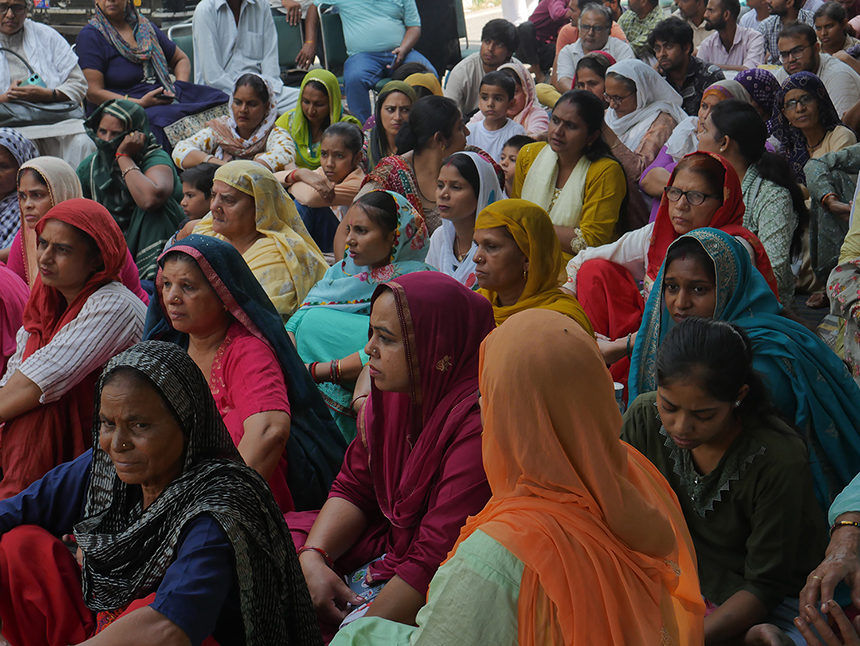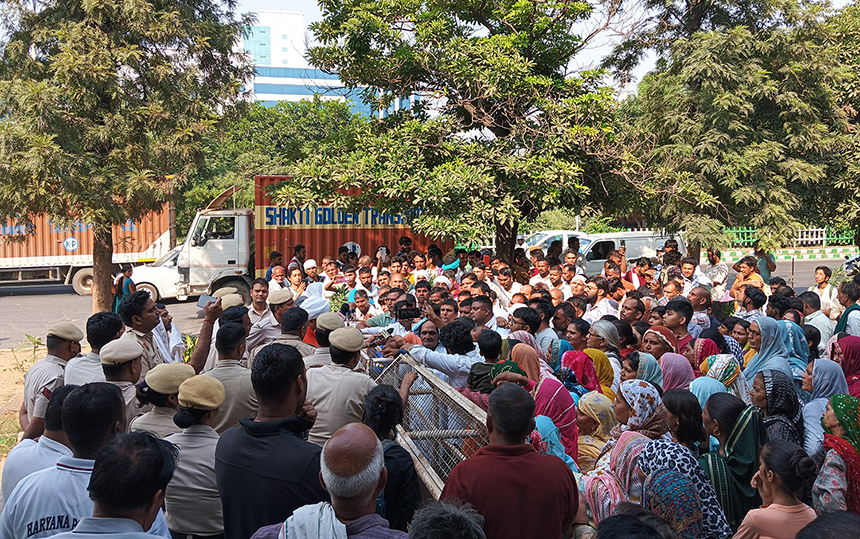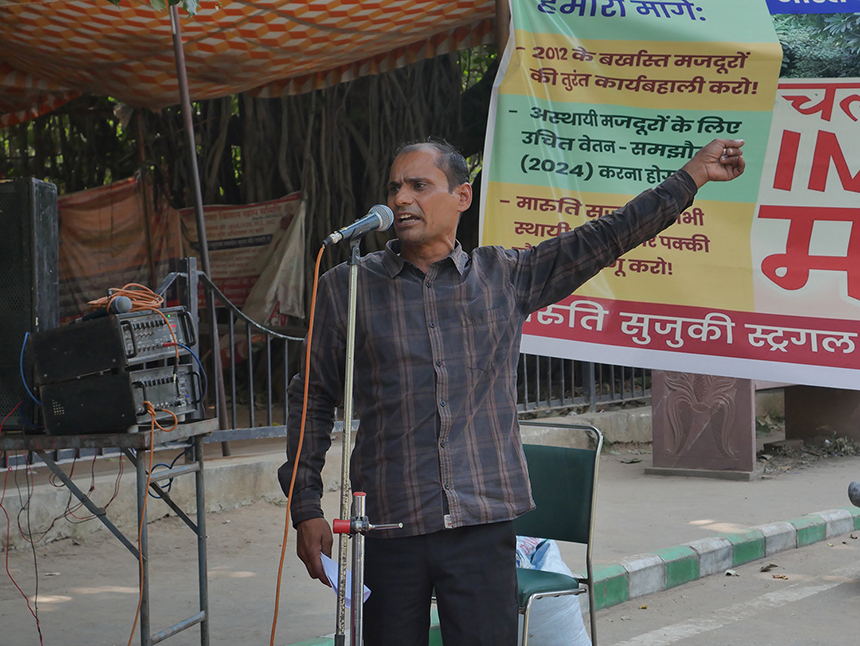A day-long program ‘Chalo IMT Manesar’ was organised in support of over one-month long retrenched Maruti workers’ struggle demanding their reinstatement by the company. These workers were terminated twelve years back following a violent incident inside the Manesar plant. The dismissed workers were later acquitted by the court.
Groundxero | October 18, 2024
Maruti Suzuki workers – terminated and vilified by the company and the state in 2012 – have been sitting on an indefinite dharna near Manesar DC office since 18th September this year, under the banner of their own collective titled Maruti Suzuki Struggle Committee (MSSC). Over the last 12 years, these workers have fought a long legal, social and financial battle to deal with the burden of misfortune that landed upon them and their families. 546 permanent and 1800 contract workers of Maruti Suzuki were terminated from jobs, and several were jailed for numbers of years despite the company failing to prove them guilty in the court.
On 18th October, a month from the day the dharna began, the workers are still continuing their protest with no response from the Maruti management. Today, they have organised a day-long program ‘Chalo IMT Manesar’ in which their family members, labour activists, independent activists, students and journalists joined and participated in solidarity with the workers’ demands. The demands are not limited to their own reinstatement in the company, but keeping at per with the ideology of equality that drove the Maruti workers back in 2012 to unionise and struggle under heavy pressure, they are also demanding a 40% wage hike and establishment of equal rights for the existing contract workers, temporary workers, casual workers, apprentices, student trainees, NEEM trainees etc., who comprise a massive 77% of the total workforce in the three plants of Maruti Suzuki in Haryana. Despite the fact that it is illegal to employ temporary/ contract workers in the permanent/perennial nature of jobs in the core production, companies like Maruti Suzuki have been doing this for years. Moreover, they are violating the ‘equal pay for equal work’ rule.
Even since their termination, very few of the workers managed to get an employment elsewhere that could facilitate a basic comfortable life unburdened by loans or other worries. Illegally terminated and criminalised at the prime of their lives, on top of battling social stigma, many of them tried to do small businesses with inadequate capital or moved to daily wage works or gig works – unsuitable for their age or experience – leaving them vulnerable to further financial insecurity in the face of accidents, diseases as well as major national or global crises such as demonetisation and pandemic.
For these workers, the present dharna symbolises the struggle of not only the terminated workers but also their families – including their children, who could have had a better life, had their fathers not lost their best years fighting an unfair and unequal battle with the company. Whereas, the permanent workers, represented by the Maruti Suzuki Workers Union are drawing close to one and half lakh rupees monthly salary, and recently signed yet another wage hike agreement of ₹30,500 with the management.
Even today, the protesting terminated workers are facing harassment from the administration and the police, allegedly instigated by the Maruti management. Although they received court permission to sit on dharna 500 metres away from the boundary of the factory gate, in reality they were forced to organise their peaceful protest about 8km away, near the Manesar DC Office. In the past few days they have been repeatedly threatened with eviction from the dharna site by the police and the administration. On 15th October, SDM Manesar sent prohibition notice to the workers ‘advising’ to discontinue their dharna. The administration has also tried to stop them from distributing leaflets, sticking posters and even cooking food at the protest site. In fact, on 17th Oct, two workers were picked up by the CID and detained for nearly 7 hours by the police for distributing leaflets to night-shift workers. During the Chalo IMT Manesar program, workers protested against such harassment by confronting the police at the barricade placed by them.
Other than criticising the anti-worker role of the management, government and police, the speakers at the program highlighted the dire situation of the Indian working class. At the moment, there are incidents of workers’ unrest all across the country. There is an increasing contractualisation of work, unemployment, privatisation, extreme price hikes, over-production of commodities, climate crisis, land-grab, caste-gender-religion based crimes and severe state repression on any attempt at organising workers – especially contract workers in industrial belts such as Manesar and Kundli in Haryana, Sriperumbudur in TN, SIDCUL in Uttarakhand etc. Despite such repression by the state-corporate nexus and their hired goons, workers are going on strike to assert their right to unionise, demand wage hike, bonus, PF and dignified working conditions. Several speakers at the program urged the labour activists and struggling workers to unite and “fight each other’s fights like your own.”
The speakers also discussed different ways in which the workers are being divided not only by providing different wages and facilities for the same work, but also by using caste-religion-gender based discrimination strategies. It was also mentioned that the largest section of the police, security forces and bouncers, who are used by the state and the corporate to break protests come from the same economic background as the workers – from the very same families. Despite bestowing them with power over the civil society, the lower strata of police and security forces are often exploited by the same state and the corporate. And yet, these divisions are kept alive to the benefit of the business elites – in particular the foreign investors, such as in the case of Maruti Suzuki.
Slogans such as “Bharat mein Suzuki ka samvidhan nahi chalega”, “Kaun banaya Hindustan / Bharat ke mazdoor kisan”, “Rozi roti na de sake jo / Wo sarkar nikammi hai” in a way demonstrate the political understanding of the exploitative capitalist system by the workers. As a worker pointed out, even in case, the company denies to take them back but opts for a compensation tor the 546 workers along with the thirteen workers who were given life-sentence (now out on bail except the two who tragically passed away earlier), the total amount the company need to pay would be a negligible – a fraction of the monthly revenue of Maruti Suzuki India. Maruti Suzuki India has an annual revenue of ₹1.3 trillion. So, a few hundred crores of compensation to the illegally retrenched workers will be nothing. But it would set an example of the workers’ victory. It would validate the severe unfair treatment of the workers by the company and the state of Haryana and inspire hope and courage among other workers, as it did in 2012, which the company bosses cannot allow.
Apart from workers and their family members, the speakers in the Chalo IMT Manesar program were from organisations such as Jan Sangharsh Manch, Central for Struggling Trade Unions, Mazdur Sahyog Kendra, Inquilabi Mazdur Kendra, Krantikari Mazdur Morcha, Shramik Sanyukt Morcha, Sramik Sangram Committee, Mazdur Sahayta Samiti, SUCI, MASA, AICWU and Mazdur Adhikar Sangathan from Haryana, Delhi and Uttarakhand.
Worker leaders from Bellsonica Union, Manesar, Karolia Lighting Union, Rudrapur, Rocket Riddhi Siddhi Union, Rudrapur, youth and students from Krantikari Naujawan Sabha, Disha Chhatra Sangathan, Collective, PSYA, DSF and AISA from Delhi, Gurgaon and Jaipur also joined the program, addressed the protesting workers and performed protest songs.




